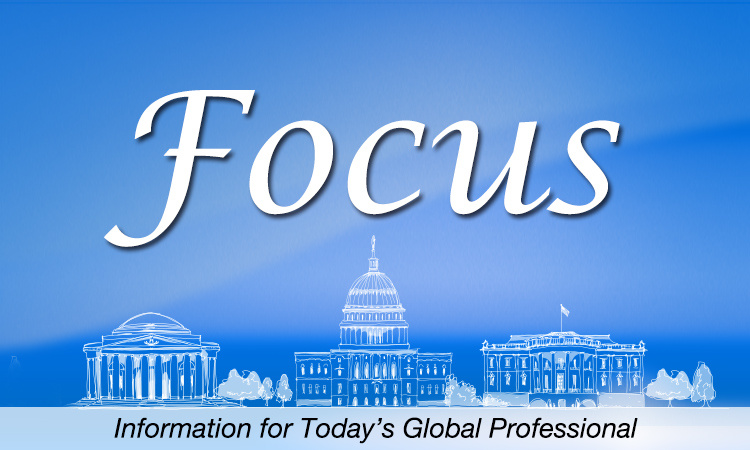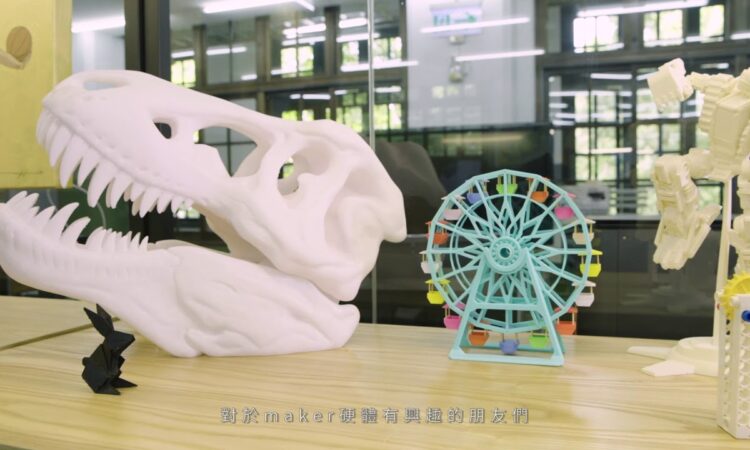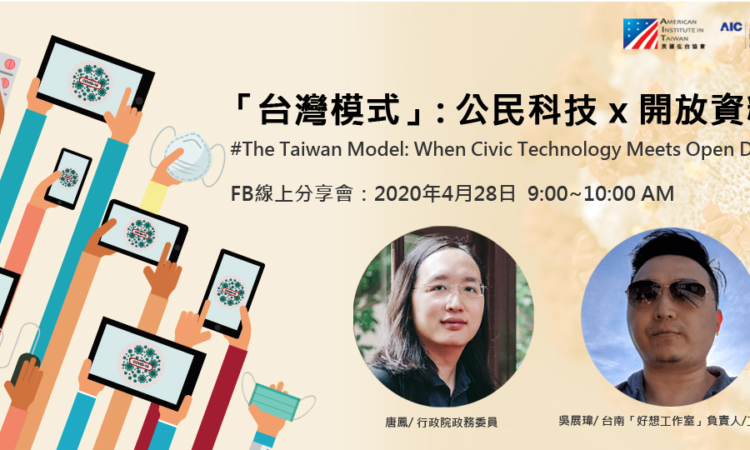如果您對下列項目有興趣,請與美國資料中心聯絡。電話:2723-3959 轉 202。
- 十月八日 (星期一) 美國哥倫布日,放假
- 十月十日 (星期三) 台灣雙十節,放假
To receive or reserve any of these items, please contact Information Resource Center at 2723-3959, ext. 202 or aitirc@mail.ait.org.tw.
- October 8 (Monday) Columbus Day. Closed.
- October 10 (Wednesday) National Day. Closed.
1. 美國在台協會處長酈英傑 「GEC+ 2018 全球創業大會開幕典禮」致詞。
Remarks by Director Brent Christensen at the GEC+ Opening Ceremony. 
AIT OT-1828, September 27, 2018, 2 pages.
“The GEC+ will explore how entrepreneurs can use artificial intelligence and the internet of things for social good. From our perspective, the theme of this event perfectly encapsulates some of the best the U.S.-Taiwan technology relationship has to offer.” (From AIT)
2. 美國在台協會處長酈英傑 「世界台灣商會聯合總會第24屆年會」致詞。
Remarks by Director Brent Christensen at the World Taiwanese Chambers of Commerce. 
AIT OT-1827, September 25, 2018, 2 pages.
“In the years ahead, as business relationships evolve in the Indo-Pacific region, I believe the role and importance of Taiwan businesses will continue to grow and expand around the world.” (From AIT)
3. 美國在台協會主席莫健 在「全球台灣研究中心年度論壇」演講。
Remarks by AIT Chairman James Moriarty at the Global Taiwan Institute Annual Symposium. 
AIT OT-1826, September 20, 2018, 7 pages.
“Taiwan is not just a vital and reliable partner in the Indo-Pacific region; it is also a force for good in the world. That is why Taiwan merits our continued strong support.” (From AIT)
4. 美國在台協會處長酈英傑於「美國在台協會 – 經濟部:私募基金論壇」致詞稿。
Remarks for Director Brent Christensen at the AIT-MOEA Private Equity Forum. 
AIT OT-1825, September 14, 2018, 2 pages.
“The Private Equity Forum is part of an ongoing dialogue about the investment climate in Taiwan and part of the effort to raise awareness about the role of private equity in today’s economies.” (From AIT)
5. 美國在台協會副處長谷立言致詞 AI論壇:從人工智慧到強化智慧。。 
Remarks by AIT Deputy Director Raymond Greene, AI Forum – From Artificial to Augmented Intelligence. 
AIT OT-1824 September 6, 2018, 2 pages.
“As part of the United States’ Indo-Pacific Strategy, we hope to work closely with Taiwan on infrastructure, the development of cleaner energy, and the digital economy. AI will be central to all three.”(From AIT)
6. The New Arab Order: Power and Violence in Today’s Middle East. 
Foreign Affairs, September/October 2018, 7 pages.
“In 2011, millions of citizens across the Arab world took to the streets. Popular uprisings from Tunis to Cairo promised to topple autocracies and usher in democratic reforms. For a moment, it looked as if the old Middle Eastern order was coming to an end and a new and better one was taking its place. But things quickly fell apart. Some states collapsed under the pressure and devolved into civil war; others found ways to muddle through and regain control over their societies. Seven years later, those early hopes for a fundamental, positive shift in Middle Eastern politics appear to have been profoundly misplaced. But the upheaval did in fact create a new Arab order—just not the one most people expected. Although the Arab uprisings did not result in successful new democracies, they did reshape regional relations.” (From Foreign Affairs)
7. Sutter, Robert.
China-Russia Relations: Strategic Implications and U.S. Policy Options. 
The National Bureau of Asian Research, September 2018, 26 pages.
“This report provides an overview of the scope and implications of China-Russia relations, explains why Sino-Russian cooperation against U.S. interests has increased during the past decade, assesses key determinants, and examines U.S. policy options. (From the National Bureau of Asian Research)

8. Morrison Wayne M.
The Made in China 2025 Initiative: Economic Implications for the United States. 
Washington, D.C.: Congressional Research Service, August 29, 2018, 2 pages.
“China’s incomplete transition to a free market economy stands out as one of the biggest sources of trade friction with the United States. Recent proposals by the Chinese government, such as its “Made in China 2025” initiative, appear to signal an expanded role by the government in the economy, which many fear could distort global markets and negatively affect U.S. firms. The Trump Administration has made MIC 2025 a major focus of its Section 301 actions against China over its alleged distortive policies related to technology transfer, intellectual property, and innovation.” (From CRS Report)
9. Schnepf, Randy.
Farm Policy: USDA’s Trade Aid Package. 
Washington, D.C.: Congressional Research Service, September 12, 2018, 13 pages.
“In early 2018, the Trump Administration —citing concerns over national security and unfair trade practices—imposed increased tariffs on certa in imported products in general and on U.S. imports from China in particular. Several of the affected foreign trading partners responded to the U.S. tariffs with their own retaliatory tariffs targeting various U.S. products, especially agricultural commodities. (From CRS Report)
10. Stokes, Bruce.
A Decade After the Financial Crisis, Economic Confidence Rebounds in Many Countries.
Pew Research Center, September 18, 2018, 33 pages.
“The improvement in the public’s economic mood has been dramatic in some nations, but pessimism about the future lingers, as does a sense that economic conditions were better pre-crisis.” (From Pew Research Center)

11. Garrett, R. Sam.
Federal Role in U.S. Campaigns and Elections: An Overview. 
Washington, D.C.: Congressional Research Service, September 4, 2018, 43 pages.
“The report addresses those areas of law and public policy that most directly and routinely affect American campaigns and elections. This includes six broad categories of law through which Congress has assigned various agencies roles in regulating or supporting campaigns, elections, or both. These are campaign finance; election administration; election security; redistricting; qualifications and contested elections; and voting rights.” (CRS Report)
12. Mills, Mark P.
The Real Fuel of the Future: Natural Gas. 
Manhattan Institute, September 8, 2018, 20 pages.
“Accelerating America’s LNG exports would greatly expand the domestic economic benefits from shale gas. America’s natural gas industry already employs 3 million Americans and adds more than $350 billion to the economy. Expanding exports would continue price pressure on world gas markets, to the benefit of citizens everywhere. Finally, if the U.S. becomes the world’s dominant LNG exporter, such geopolitical “soft power” would counterbalance the influence of Russia and the Middle East on the world stage.” (From Manhattan Institute)
13. Flournoy, Michèle and Michael Sulmeyer.
Battlefield Internet: A Plan for Securing Cyberspace. 
Foreign Affairs, September/October 2018, 6 pages.
“The Internet has always been much more than a venue for conflict and competition; it is the backbone of global commerce and communication. That said, cyberspace is not, as is often thought, simply part of the global commons in the way that the air or the sea is. States assert jurisdiction over, and companies claim ownership of, the physical infrastructure that composes the Internet and the data that traverses it. States and companies built the Internet, and both are responsible for maintaining it. Actions taken in the public sector affect the private sector, and vice versa. In this way, the Internet has always been hybrid in nature.” (From Foreign Affairs)

14. ITIF Technology Explainer: What Is 5G? 
Information Technology and Innovation Foundation, September 10, 2018, 2 pages.
“5G is the latest in the evolution of mobile wireless technologies. 5G goes beyond 4G LTE, and is expected to bring not just faster downloads, but a much more flexible and responsive network that can adapt to enable different uses. The benefits of next-generation wireless capabilities will reverberate throughout the economy, so it makes sense to adjust policy to spur its deployment and use.” (From Information Technology and Innovation Foundation)
15. Technology in US Schools: Are We Preparing Our Kids for the Jobs of Tomorrow? 
PwC network, September 12, 2018, 12 pages.
“The study has significant implications for workforce preparedness and the US economy. By 2020, 77% of all jobs will require some degree of technological skills, and there will be one million more computing jobs than applicants who can fill them. That means there’s a growing need for workers trained in STEM skills but a shortage of graduates who have them. In fact, according to PwC’s annual CEO Survey, 79% of US CEOs are concerned that a shortage of people with key skills could impair their companies’ growth.” (From PwC network)
16. Wike, Richard and Bruce Stokes.
In Advanced and Emerging Economies Alike, Worries About Job Automation: Many Fear Robots, Computers will Eliminate Jobs, Increase Inequality. 
Pew Research Center, September 13, 2018, 7 pages.
“Across the globe, new technologies are transforming the nature of work. Advances in robotics and artificial intelligence are displacing jobs in manufacturing and, increasingly, in the service sector. And while automation may boost productivity and overall economic growth, there is a recognition that it will also disrupt the workplace, with repercussions for workers, employers, education systems and governments.” (From Pew Research Center)
















![Video Thumbnail [Recovered]-01](../wp-content/uploads/sites/269/Video-Thumbnail-Recovered-01-1-750x450.jpg)









